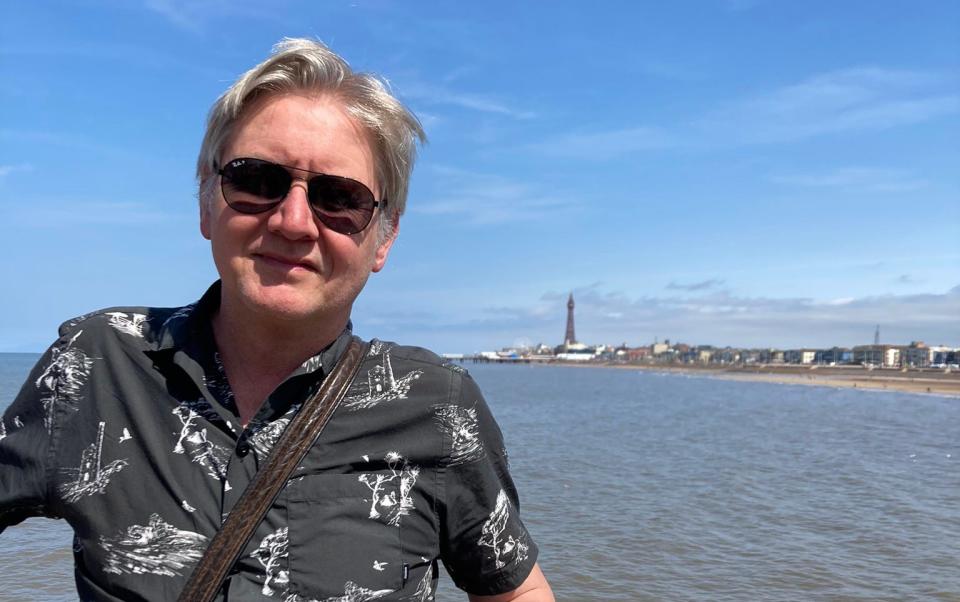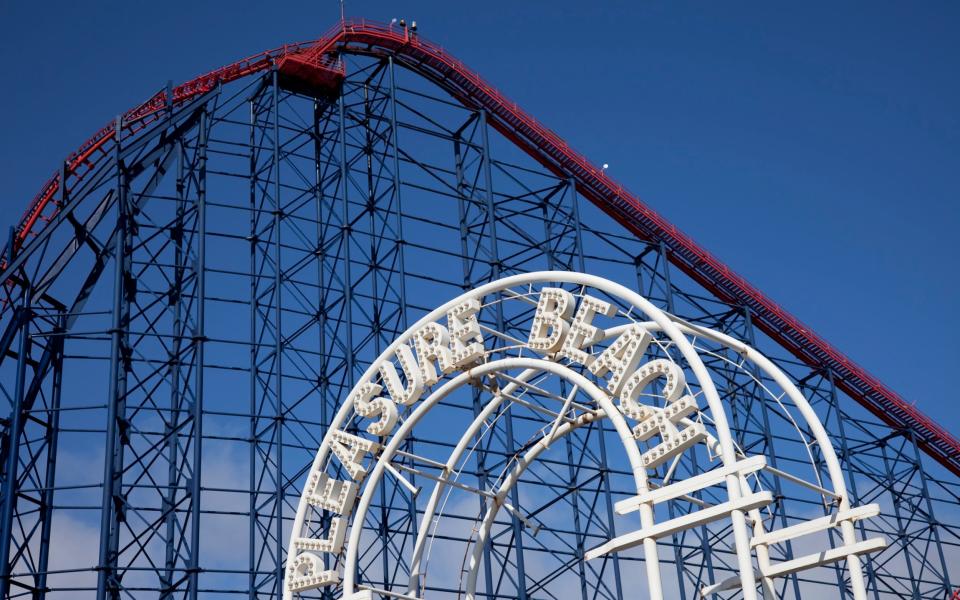The 'godawful' British seaside town that began life as a posh Victorian resort

Perhaps it was the sultry heatwave at the end of July and the cloud-free, brilliant blue sky. Or that it was a Saturday after a busy working week, and I was visiting with an old friend. Or that there was a particular buzz in the air, because the Commonwealth torch was arriving in the afternoon, and thousands of Rangers fans had descended for a friendly match against the Seasiders.
Or perhaps it was just Blackpool, being itself – and a lot more exciting, more enthralling, and more aesthetically pleasing than I remembered.
Because that’s the thing with Blackpool – we share collective memories of it as a nation and, for those of us who grew up in Lancashire, personal recollections of childhood visits, too. Between the halcyon days of the latter and the reflexive moroseness of middle age, not every foray will match the wonderful warmth of the best family holiday. But, sometimes, Blackpool can, still, surprise.
One thing that I couldn’t fail to notice on that sun-baked Saturday – Blackpool was busy. A recent survey by Place Informatics, which monitors footfall, recorded 11.5 million visitors to Blackpool in the 12 months to June 2022 – an increase of 5.2 million on the previous year. This positions Blackpool ahead of all British seaside resorts except Brighton and, marginally, Bournemouth, both of which are in the relatively wealthy, densely populated southeast.
Yet, we are continually told the British seaside is rundown and/or grim, and that Blackpool, in particular, is a health and crime blackspot and one of the worst places to live – or as Tory MP Heather Wheeler subtly put it, “godawful”.
Something doesn’t quite add up – or does it?

Blackpool was a humble sea-bathing spot in the 1770s, but only grew into a substantial resort 100 years later, long after Scarborough and some decades behind local rival Southport. Isolated from good roads and surrounded by farmland, it was hard to get to and short on amenities. Nonetheless, along with a handful of well-to-do waders from Lancashire high society, there came artisan workers from the milltowns around Burnley. Dubbed ‘Padjamers’ – because some came from Padiham – they travelled by cart, on foot and riding pillion on horseback, believing seawater had “physic” or health-giving properties.
In the Victorian era, there were attempts to keep the resort for posh people, but loose planning laws and no lord of the manor bent on building mansions for his kind of people meant Blackpool evolved piecemeal. The beach turned into a meeting place for the masses, part urban fair, part country fete. There were freak shows, waxworks, monstrosities, quack medicines, popular dramas and small mechanical rides. Taking advantage of trains to Preston, Manchester and the West Riding, trippers came in their hundreds of thousands. Blackpool became the first working-class holiday resort in the world.
The golden age came at the end of the century, with the opening of the Winter Gardens, erection of Blackpool Tower and beginnings of the Pleasure Beach. Blackpool was glamorous and cosmopolitan. Of the Winter Gardens, a historian wrote: “Visitors were taken on a journey – inspired by international exhibitions and current fashions – from India to Spain, from pirates to princes, from extravagant High Victorian to elegant Streamline Moderne.” The widespread adoption of Wakes Weeks holidays in milltowns saw visitor numbers soar – as many as 17 million a year by the 1950s.

Every entertainer, from Arthur Askey and Thora Hird to Frank Sinatra and The Beatles, wanted to play Blackpool. Morecambe and Wise, who performed there more than 1,000 times during their long career, called it their “spiritual home.”
Decline hit the town hard. When Pevsner wrote about Blackpool in 1969 he noted with some surprise that it had no listed buildings. It was one of the last local authorities to designate Conservation Areas, and during the 20th century the town lost dozens of landmarks. It was assailed by roads and multi-storey car parks. Eye-catching theatres and elegant townhouses were replaced by amusement arcades and shops.
In Blackpool’s success lay its potential ruin. As both residential and holiday town, it was defiantly proletarian; when the UK economy tanked in the Sixties and Seventies, Blackpool was doubly damaged. Many B&B owners turned to the DHSS for tenants and the long story of the centre’s transformation into a sink estate for some of the poorest, most marginalised and least healthy members of society began. When people could travel, they opted for packages in Spain and Greece. Blackpool survived on elderly people’s memories and ex-miners taking convalescence breaks.
A story of doom and gloom has dominated reports on Blackpool for two decades. But the secret of its appeal to a surprisingly diverse demographic is still intact – and has deeper roots than the socio-economic malaise. Indeed, the town’s willingness to accept the poor and needy is itself part of its basic DNA.
Because Blackpool is democratic, welcoming to all and stridently populist. It has retained the elusive magic of a collective experience. In the bars and pubs, chip shops and arcades, on the trams and the three piers, it’s a resort where you can mix with anyone and everyone. Blackpool treats everyone the same.

The resort displays a remarkable ability to adapt to change and reinvent itself. The annual Rebellion festival, launched in 1996, draws punks of all ages from around the UK and overseas. Last weekend’s gathering saw The Stranglers, Gary Numan, Skids and Undertones play to packed crowds. The town’s Pride parade is no mere token or bandwagon event; Blackpool is internationally recognised as an LGBT trendsetter.
There are smaller pockets of innovation all over, like the Art B&B, with rooms designed by artists, the swanky Mode apartments in the Art Deco Music Hall Tavern or the clever designers who have turned the old Pump and Truncheon pub into No 13 Bonny Street and protected a lovely old frontage.
The centre might be chaotic and a bit garish, but the Tower – once the country’s tallest man-made structure – still rises high above, phallic, iconic, loftily distant from the melee and downright handsome. Its interiors – Frank Matcham’s ballroom, Maxwell and Tuke’s Moorish circus arena – are still drop-dead gorgeous, as are the views of the Fylde Coast from the 380-feet Tower Eye.

The Imperial and Metropole hotels, Central Library, Casino and Grand Theatre are throwbacks to a time when proud civic burghers beautified their towns rather than feathering their nests; no wonder Strictly Come Dancing loves to come to Blackpool, even if our sniffy politicians now largely disdain it for their conferences.
In 2019, Blackpool had 14.75 million day trippers and 3.38 million overnight visitors – the latter is the more staggering statistic. It’s impossible to generalise about why people keep coming. Many visitors no doubt concur with Sarah, 53: “I have really fond childhood memories of a place that felt totally different from Bolton where I grew up. My grandparents went during the Wakes Weeks. Blackpool gives me nostalgia, spectacle and a special connection.”
Many come for the world-class rides, which are as impressive as any in Orlando. Families love Blackpool because it provides plenty of safe spaces for children.
“It has lovely beaches, seven miles of them,” says Les, 44, from Halifax. “People sometimes forget the sea because of all the rides and amusements.”
The resort never sits on its laurels. A new £1 million Peter Rabbit attraction opened in February, a Harry Potter-inspired mini golf course called Hole in the Wand in May, and the Arcade Club, for retro gaming aficionados, in June. There’s an air show next weekend, the World Fireworks Championship Blackpool over four days in September and October, and, from August 30, all manner of events linked to the Illuminations.
Thus, despite all prophecies to the contrary, Blackpool endures. It has something for everyone, sophisticated with a common touch, and very entertaining. I was verging on euphoric when I was there on that Saturday, and came away feeling I needed to make regular, frequent, fun-seeking visits – Blackpool has been doing that to people for 250 years.
Only in Blackpool: five things you can’t leave without doing
Stroll along the prom, prom, prom
Blackpool’s Promenade is a very distinctive combination of sea breezes, golden sands, historic piers, cutting edge sea-wall architecture, public art and people of every stripe and style. An hour’s stroll will reveal more about modern Britain than any earnest documentary.
Take a tram along the Golden Mile
There are frequent departures along the front between Starr Gate and Fleetwood Ferry; there’s a vintage tram and a full-blown vintage weekend on August 27-29.
Ride on something terrifying
Take your pick between the Skyscreamer reverse bungee on South Pier, the Icon and Big One roller coasters at Pleasure Beach, or the white knuckle slides at Sandcastle Waterpark.

Eat salty and sugary delights
Enjoy cockles or oysters (from Roberts) for starters, fish and chips (from Papa’s) for mains and ice cream (from Notarianni) or a stick of rock for dessert.
Do the Blackpool Illuminations
They’ll be switched on by Johnny Vegas (the voice of this year’s ‘Nigel C Gull’ marketing campaign) on September 2, running till January 2, 2023. Joining a six-mile traffic jam might not sound like a grand evening out – but it is! (On August 30, Ride the Lights invites cyclists to travel the route and enjoy a car-free sneak preview.)

 Yahoo Movies
Yahoo Movies 
